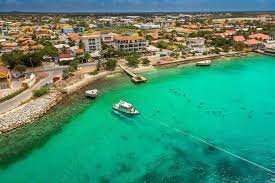Caribbean island of Bonaire to sue Dutch government over rising seas

The Dutch government faces a court case to make it protect the people of the Caribbean island of Bonaire from rising sea levels, environmental group Greenpeace said Wednesday.
Greenpeace and residents of the tiny Dutch territory are set to file the case in The Hague district court later in 2022 following a study that highlights the perils of climate change, it said.
As much as one-fifth of Bonaire could be swallowed up by the sea by the end of the century, according to the study by Greenpeace and Amsterdam’s Vrije Universiteit.
Coral could also be decimated around the island, one of the world’s most spectacular spots for tourists which are a major source of income for residents, it said.
“What we hope is to force the Dutch government to do everything in their power to keep the people of Bonaire safe from the consequences of climate change,” Greenpeace’s head of climate and energy Faiza Oulahsen told AFP.
Greenpeace said the lawsuit “is something that we will prepare together with residents of Bonaire.”
Bonaire in the Leeward Antilles Islands is one of the Netherlands’ former colonies in the Caribbean.
In 2010 it became one of three so-called special municipalities of the Netherlands along with Saba and St Eustatius, while the islands of Curacao and St Maarten are independent states in the Kingdom of the Netherlands.
The study says that even in the best case scenario, with global temperatures rising by 1.4 C, a large part of Bonaire’s low-lying southern area will be irrevocably flooded.
“By the end of this century, as much as one-fifth of the island may have disappeared underwater,” the study said.
Oulahsen said Greenpeace planned to lodge the case before the Hague District Court “later in the year.”
The lawsuit will say the Netherlands, itself a worldwide specialist on water management due to its low-lying terrain, “also has a responsibility towards its citizens in the Caribbean Netherlands.”
The case could be used as a blueprint for other communities asking for similar support from big governments, Oulahsen said.
“What makes this case unique is that it’s not just about demanding CO2 reductions, it’s also about what are you [the government] going to do to keep the islands safe,” she said.
The Dutch government has faced a series of other lawsuits aimed at reducing emissions, including a landmark case in 2019 in Dutch courts, ordering it to reduce greenhouse gas emissions by at least 25 percent by the end of 2020.




